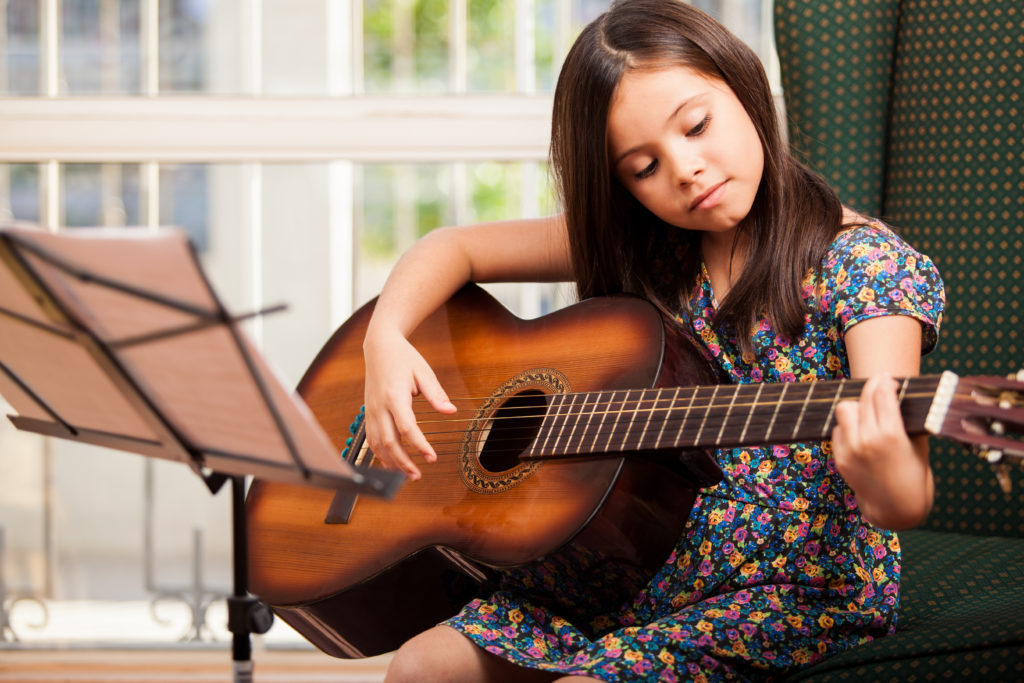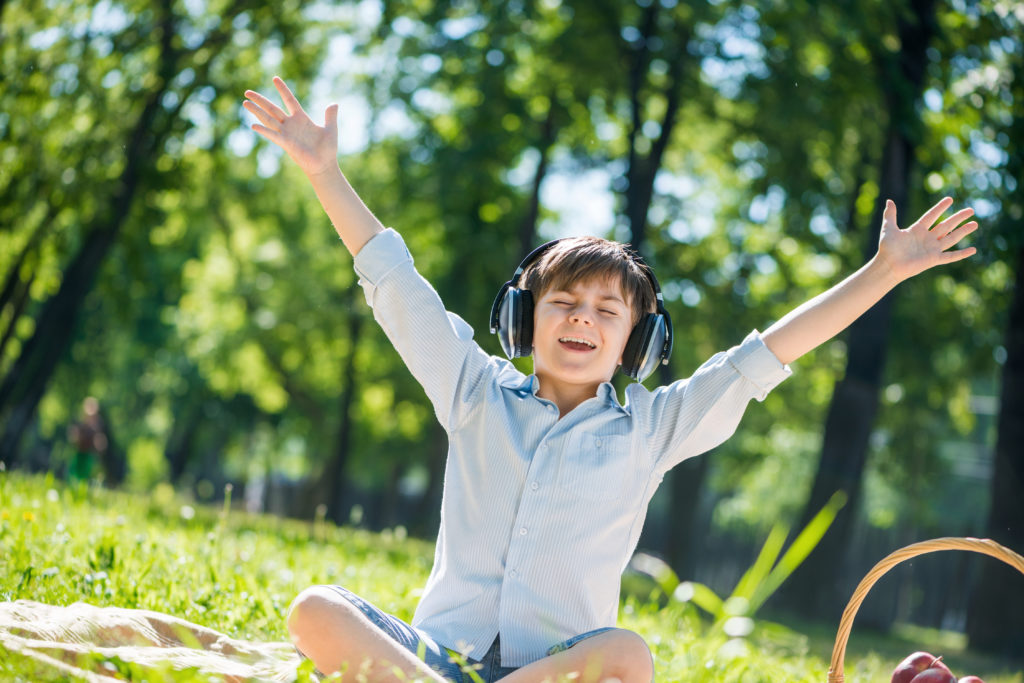Music is humanity’s universal language which can help people connect, communicate, express, learn and grow. Music can also be a therapeutic tool to develop children’s physical, emotional and social well-being. By supporting them in expressing their feelings and developing their cognitive functions, music can help children feel included and boost their self-esteem.
How music affects children’s brain
Research has shown that music activates and stimulates the brain in several beneficial ways. It can cause the release of dopamine, the neurotransmitter that boosts feelings of well-being, and it can also activate the limbic system, which is responsible for functions such as memory and emotional processing (Daren, 2023).
Music is important for child development, especially during the early years, since it affects children’s intelligence and emotions, and it helps them acquire skills, including early language development, an increased ability to learn foreign languages, improved mood and emotional regulation, improved memory and concentration as well as self-confidence, self-esteem and self-expression (School of Rock, 2023). Early brain development is all about building connections through input from the outside world, and music provides a rich and supplementary source of input as young brains develop (Daren, 2isolated023).
Defining well-being: physical, emotional and social aspects
While the term well-being is used increasingly in policy, practice, and research, the challenge remains in ensuring a shared understanding of the term. Definitions are also hard to come by, particularly concerning children and young people. It is most commonly, and historically, linked to the idea of the flourishing human, but further detailed definitions are more challenging to determine.
In particular, the concept of well-being encompasses multiple dimensions of well-being, such as physical, emotional and social well-being (Robb, 2023). In this sense, music can promote children’s well-being in these three dimensions thanks to its universal language.
Enhancing physical health through music
Music motivates children to be physically active and improves their overall physical abilities. Through the reduction of muscle tension and the improvement of coordination and movement, music is a beautiful way of assisting children’s physical development.
For instance, through dancing, music appears to affect our bodies’ neurochemicals resulting in a boost to the immune system, warding off infection and helping to prevent obesity (Zenin, 2016). Playing instruments and or rhythmic activities can also improve posture, balance, coordination and physical control, as well as banging drums and action songs builds dexterity, hand independence, and gross and fine motor skills (King Lee, 2023)
It has been shown that music reduces stress and anxiety, promoting well-being and aiding in healthy child development. These cognitive effects are mainly seen when children have active exposure to music, such as learning to play an instrument or taking voice lessons. Music can also boost language acquisition in young children, including in the case of difficulties in pronouncing words.
Music “primes the brain for learning” and helps children learn to read and speak while building their memory and attention (Daren, 2023). Research has shown that music can stimulate the brain, and improve memory, concentration and quality of life at any age. Many children’s songs are specifically designed to teach concepts such as counting, pairing and problem-solving (King Lee, 2023). Music can also help teach other age-appropriate subjects, such as science, by linking facts with a melody (Daren, 2023).
Cultivating emotional balance with music
Listening to, singing and making music impacts our emotions and those of children. Along with a boost in confidence, researchers have discovered that music can decrease the amount of the “stress hormone” cortisol. Furthermore, research suggests that music can stimulate the body’s natural feel-good chemicals (e.g. endorphins, oxytocin) which can help energise our mood and even help us work through problems and provide an outlet for us to take control of our feelings (Zenin, 2016).
Moreover, music can be an important component of improving mental and emotional health in children in a non-invasive way. It can help soothe overstimulated kids or those who have trouble regulating their emotions. Although it likely won’t be able to address all of a child’s mental health needs, it can be an important supplemental tool that can provide significant benefits (Daren, 2023).
Without us even realising it, listening, singing or writing music can be extremely liberating and give the chance to children and young people to express their feelings. Music can help them in finding the right words to describe how they are feeling. Writing it, in particular, can be good for emotional development and resilience.
Whether it is playing an instrument, writing down lyrics or just making a racket, it all counts. The act of creating music requires focus, and often collaboration with others. This experience can encourage a child to be more sensitive and conscious of their feelings, whilst also creating something of their own in the process (Hebert, 2023).

Fostering social connections through music
As the prevalence of social anxiety grows in children in the world we live in today, the importance of social development has never been greater. Based on the ample research available, music can play a pivotal role in promoting healthy, positive social development as well as preventing and remedying social issues when embedded in educational settings.
According to some research, incorporating music into the curriculum has proven to increase social bonds, and allow for improved social adjustment. Thanks to music, overall attitudes in children were more positive (Zenin, 2016).
Moreover, music helps to create a feeling of group togetherness or bonding. When a young person listens to their favourite artists they can relate their feelings to something else. Music contributes to making them feel more understood and less isolated from their emotions (Hebert, 2023). Making music with other people can also increase cooperation skills as well as a sense of empathy and self-esteem.
Music as a transformative therapy
Music can be a powerful tool, especially for children with disabilities. Children with intellectual disabilities can use music as an outlet to make them feel good about themselves and to feel relaxed. This is especially true with percussion instruments that require attention to rhythms, such as the piano or drums (Cervino, 2021).
Nonverbal children and children with language difficulties can use music to help them vocalize by making sounds or different noises and they can act as a medium through which they can express themselves. A child with Attention-Deficit Disorder (ADD) or Attention-Deficit Hyperactivity Disorder (ADHD) for example can focus on the musical components of a song to help increase his attention span. Music education can help children with special needs establish a greater sense of logic and organization, as music relies on the implementation of sound and rhythmic patterns (Cervino, 2021).
In a study published in the Journal of Music Therapy, researchers have found that music therapy improves communication skills, social interaction, and emotional regulation in children with Autism Spectrum Disorder (ASD). Another study published in the Journal of Intellectual Disability Research found that music therapy improved language skills and reduced anxiety in children with Down syndrome (King Lee, 2023).
Research also proved that using a musical instrument that requires swift motions (i.e. guitar, trombone, violin, drums) improves children’s motor skills and multitasking skills. In addition to paying attention to their motions, they must also concentrate on the music that’s being produced (Cervino, 2021).
Finally, creating and playing music gives children with special needs a sense of accomplishment while working on improving their cognitive areas. It is important to note that early music education is extremely beneficial to all children because it increases the development of many areas of their brain and helps them improve memory retention (Cervino, 2021).
Tips for supporting children’s well-being with music
Music is a powerful tool which produces its effects without even realizing it. Nevertheless, there are some tips to maximize its benefits to support children’s development and well-being.
- Play music every day. Play a variety of music and talk to children about how they feel before and after listening. Discuss how some songs make them feel happy, sad or excited (Zenin, 2016). Propose to the child different kinds of music, with or without words, in different languages, including songs with noises that they can recognize in everyday life.
- Dance, dance, dance. Move to music around the house or in the backyard and enjoy getting physical and encourage children to use different body parts to express how the music makes them feel (Zenin, 20216). Propose different styles of music to children to get them expressed in many different ways, also including by playing instruments while dancing.
- Don’t be afraid to sing along. Children are often less inhibited than adults when it comes to singing. But go on, let loose and feel the benefits of singing together (Zenin, 2016). Remember that adults play a significant role model for children, so it is up to them to inspire kids also in new activities and expressions.
- Make your own music. An ice cream container for a drum and a pencil for a beater is all you need! Of course, if you have an old guitar or recorder, that’s great too. Get creative and let children experiment with music (Zenin, 2016). In this sense, online resources can also provide many ideas on how to create new instruments from recycled materials as well as inspire you with different styles.

Humanium strongly believes in the importance of promoting new tools to make children free to express themselves and to better promote their rights. We focus on protecting and helping children in becoming aware of their capacities to fulfil their dreams and aspirations. If you want to support our work, please consider making a donation, volunteering or becoming a member.
Written by Arianna Braga
References:
Cervino (2021). Importance of Music for Children with Special Needs. Retrieved from Cervino at https://cdssvic.com.au/importance-of-music-for-children-with-special-needs/, accessed on 9 February 2024.
Daren S. (2023). How Music Can Be Used to Boost Mental and Emotional Health of Preschool Children. Retrieved from The Early Years Blog at https://novakdjokovicfoundation.org/how-music-can-be-used-to-boost-mental-and-emotional-health-of-preschool-children/, accessed on 9 February 2024.
Hebert, E. (2023). The magic of music on children’s emotional wellbeing. Retrieved from The Children’s Society at https://www.childrenssociety.org.uk/what-we-do/blogs/the-magic-of-music-on-childrens-emotional-wellbeing, accessed on 6 February 2024.
King Lee, L. (2023). The wonderful ways music can impact wellbeing. Retrieved from Sourcekids at https://www.sourcekids.com.au/musics-impact-on-wellbeing/, accessed on 9 February 2024.
Robb A., et al. (2023). Supporting children’s wellbeing through music participation during the COVID-19 pandemic: evidence from Scotland. Retrieved from Taylor and Francis Online at https://www.tandfonline.com/action/showCitFormats?doi=10.1080%2F03004279.2023.2219271, accessed on 9 February 2024.
School of Rock (2023). Kids & Music: Effects of Music on Child Development. Retrieved from School of Rock at https://www.schoolofrock.com/resources/music-education/kids-music-effects-of-music-on-child-development, accessed on 9 February 2024.
Zenin G. (2016). The power of music: Enhancing young children’s wellbeing. Retrieved from Care for Kids, at https://www.careforkids.com.au/childcarenews/2016/february/23/music.html, accessed on 9 February 2024.


